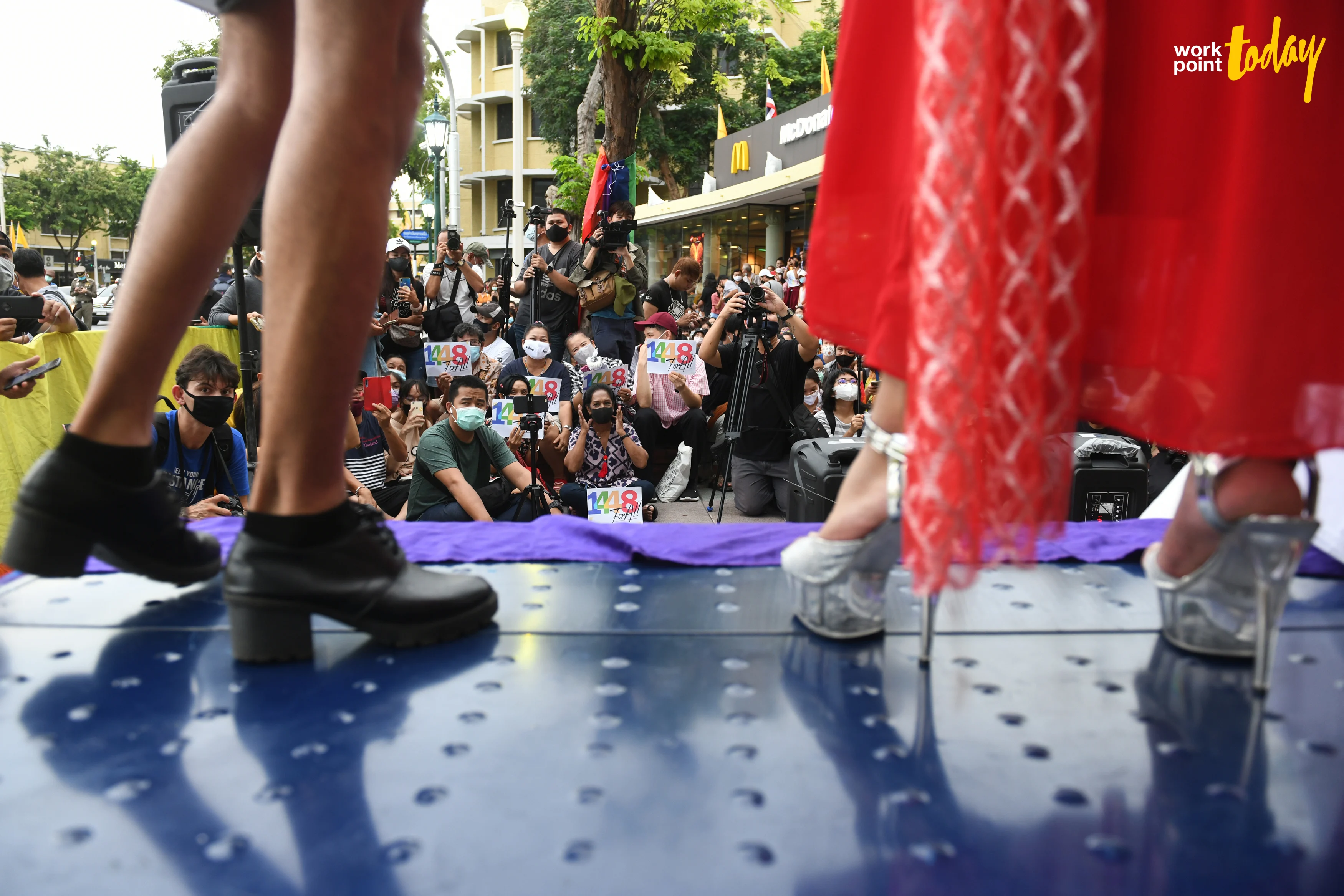It has been a weekend of political movements in Thailand. Two protests with two totally different themes but the same objective– to get rid of the current government. The two protests may also confirm that Thailand has now moved on from color-coded politics to a new era of pop culture.
Last Sunday, #LetsRunHamtaro (#วิ่งกันนะแฮมทาโร่) became the main activity for demonstrators in Bangkok. The protesters were singing the song, “Come out and run, run, run, Hamtaro. The most delicious thing is..” before uttering, “the people’s tax.” It was an activity that was a lot of fun for the demonstrators.
Hamtaro is a Japanese cartoon hamster. There are many stories about the hamsters, and Hamtaro is the protagonist. Hamtaro was broadcasted in Thailand in 2005 on Channel 7, which was the most viewed channel at the time.
Looking at the timeline, those who are 18 years old today could have watched Hamtaro since they were 4 years old, which is around the age that begins to be able to recognize cartoon characters and sounds.
This may be another reason that this song was chosen.
The leader of the demonstrators explained they chose this song because, “Compare the people like a hamster that is locked in a cage, which is like a social structure that oppresses and exploits. And today, the people are able to come out of the cage to exercise their freedom.”

On Saturday, LGBTQ demonstrators put on a skit based on the screenplay of the movies, Hor Thaew Thaek (หอแต๋วแตก). It has dialogs that are popular among the LGBTQ community, with one being about getting kicked out from home, as Thais always symbolized with its nation. In which, at one period, it was a serious political phrase that nobody challenged for a long time.
But this time, the demonstrators added to the script, “(You) kicked me out of your house, but is it really your (damn) house?”
Thailand has records of political refugees and hence it is compared to how people got kicked out to go somewhere else. This addition confirms that the protesters want to convey their message, “The owner of the country is all the Thai people.”

Beautiful Garden: Voicing it out the absurd way
The hashtag #Mobidea (ไอเดียออกม็อบ) was the top trend on Twitter at the initial stage of the protests. Numerous netizens suggested a new idea to demonstrate.
Free Youth is the largest protest after the COVID 19 lockdown. Approximately 2,000 protesters were at the venue for 8 hours, according to foreign media. The protest was located at Democracy Monument amidst a ‘garden arrangement’ by the Bangkok Metropolitan officers, which ‘coincidently’ arranged a garden on the same day, resulting in a limited space for protesters.
On the 22nd of July, students from Srinakharinwirot University under the ‘NEWGEN’ group invited netizens to ‘appreciate the newly arranged garden at 8 pm, at the Democracy Monument’ via Facebook, people shouted in unison, “The garden is so beautiful” 10 times.
Throughout the event, the protestors shouted, “The garden is so beautiful!” A short and ironic speech turned out to be very effective in the digital world.
The protestors shouted, “Dissolve the parliament!” explicitly to convey the main message at last. The fact that policemen guarded the Democracy Monument that blocked the beautiful garden showed the absurdity of society.
Absurd was a drama theory, first introduced in France during World War II. The famous story about the theory was “Picnic on the Battlefield,” which described a family picnic outdoors during the war, oblivious to what was happening. The story emphasized various irrational features, mainly to focus on the absurdity of wars and nonsensical politics.
The political disapproval was in disguise as the Garden appreciation activity displayed the theory. The policeman’s existence raised a question regarding their necessity to guard the garden visitors. Absurd drama during wartime was as comparatively as impressive to our current ‘garden appreciation’ by the Free Youth group.
“There should be two modes of demonstration; seriousness and humor, ” said Kanoon (the leader of SWU NEWGEN) to WorkpointTODAY.
“There was an impact. To my disappointment, the garden was demolished afterward. I wasn’t asking them to demolish the garden, I was asking them to demolish the parliament,” Kanoon mentioned comically.
In the end, “The garden is so beautiful” went viral on the internet. The positive, humorous phrase implied political issues on social media effectively. It became a memorable phrase for a moment.
The hashtag #protestidea eventually soared as people were still looking for unique ways of protesting to justify the police’s presence. Creativity, culture, and trendiness were great tools for this era of political demonstrations.
TikTok and Twitter, the major platforms for protestors.
A TikTok user, with the username xisminteux, posted a 6 second video showing a group of masked students, holding the three-fingered salute. This video went viral on Twitter and became the new face of Thai politics.
A Twitter user recorded herself mentioning that she wasn’t fluent with Thai. However, in the end she complained and criticized the Prime Minister with brilliant Thai skills.
The two above-mentioned contents were short and concise, with clear objectives. They ended with a plot twist that intrigued the audience. These are the guidelines for non-political viral content. The same rules also applied here.
The advancement of recent protests is greater than previous ones in Thai society, as it has stepped beyond the borderline between the physical and digital world.
Within the past seven years, Thailand saw a massive development in digital world. It was also during the absence of a mass rally in the country. The use of social media has evolved, and well as the culture. From Hamtaro to Drag Queen, the Thai youth movement has bridged the gap between online and offline. The people in power are still left unanswered on how to handle them.










